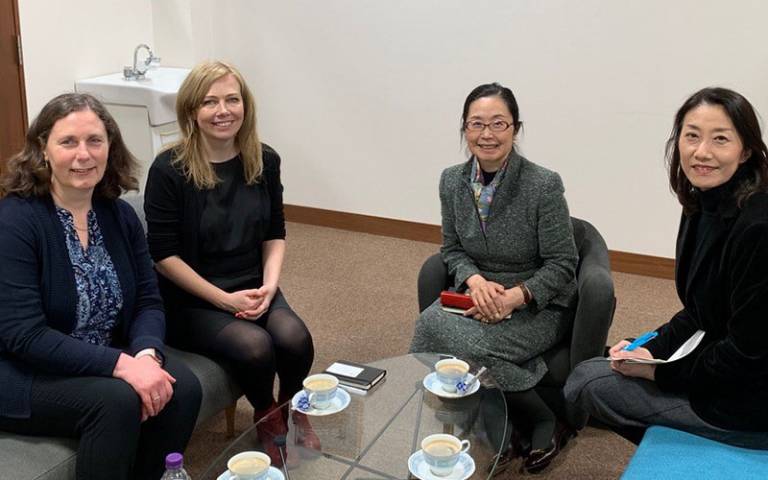Funding recipients announced for UCL-Tohoku University partnership
23 March 2020
The second round for this institutional partnership funds six projects covering areas such as health data during disasters, student mobility and neuroscience

Image: Professor Sara Mole (far left), one of the successful applicants, meets with her collaborators at Tohoku University.
Launched in 2018, the institutional partnership between UCL and Tohoku in Japan is seed-funding collaborations to aid the exchange of ideas.
Now in its second round of funding, this opportunity offers up to £10,000 per project to UCL academics collaborating with colleagues based at Tohoku, as part of the partnership between the two institutions.
The proposals were assessed by a selection panel chaired by UCL’s Pro-Vice-Provost for East Asia, Katharine Carruthers.
Following their assessment, seven UCL academics will receive funding this year. Some examples of funded projects follow.
Researching internationalisation of universities
One funding recipient is Professor Rachel Brooks, Education, Practice and Society (Institute of Education).
She has partnered with Dr Johanna Waters (UCL Geography) and several collaborators in Tohoku from their International Strategy Office; Centre for Professional Development; Global Learning Centre; and Centre for Institutional Research.
Their research explores how the UK and Japan are currently facing several challenges with respect to the internationalisation of higher education, especially those relating to student mobility.
Top universities are responsible for fostering future leaders who will be engaged not only in the domestic community but also in wider regional and global communities. Research in both Europe and East Asia indicates variations in both intentions and actions among stakeholders such as national and local governments, international and regional organisations and networks, industries and students themselves.
So how can top universities in Japan and the UK nurture future leaders with global and regional engagement in the face of ongoing geopolitical turmoil?
This funding will enable joint seminars, held at each institution, and intensive research meetings to establish dialogue and research collaborations.
Professor Brooks commented; “Based on the rich research expertise and available data resources among the members from both universities, we can expect high impact research that will contribute to international higher education research and practices. The output of these joint seminars, enabled by this strategic partnership funding, will serve as a platform for improving practices in internationalization in higher education at both universities, firstly through deeper mutual understanding of the national and regional contexts, and then through the sharing of good practice in student support.”
Creating a dataset with human reasoning
Dr Pontus Stenetorp, Computer Science (Engineering Sciences) has partnered with Professor Kentaro Inui and Dr Naoya Inoue in Tohoku’s department of System Information Sciences.
Devising computer systems capable of answering questions about knowledge described using text has been a longstanding challenge in Natural Language Processing (NLP) – a sub-field within Artificial Intelligence (AI).
This funding builds on a partnership collaboration started in 2019 in which they created a framework for annotating existing datasets with derivations, explanations that justify predicted answers. Using this framework, they created a dataset of Machine Reading Comprehension (MRC) consisting of 4,700 questions, each of which is annotated with three high-quality derivations (i.e. 14,000 derivations).
Developing MRC would make it easier to access information contained and/or derivable from text, allowing us to move beyond mere keyword search and advance the state-of-the-art in AI reasoning – enabling us to better cope with the information deluge brought about by the information age.
The funding will help build this existing collaboration and allow the team to obtain a dataset of sufficient size not only to analyse the behaviour of existing models and benchmarking, but also the ability to train deep learning models.
Dr Stenetorp added, “A dataset like this does not yet exist, it would become the defacto benchmark world-wide for researchers exploring research in the intersection of human reasoning and MRC at scale. This funding helps us to continue this critical work.”
List of funding recipients
Congratulations to all the successful 2019-20 applicants:
| Lead UCL applicant | Tohoku partner | Activity |
|---|---|---|
Professor Sven Bestmann Clinical and Movement Neuroscience (Brain Sciences) | Laboratory of Systems Neuroscience | Building a long-term, sustainable partnership in UCL-TU neuroscience including PhD exchange and monthly knowledge sharing events. |
Professor Rachel Brooks Education, Practice and Society (Institute of Education) | International Strategy Office | Exploring how we can foster global and regional engagement in future leaders through university education. |
Professor Maria Chait Ear Institute (Brain Sciences) | Human Information Systems Division | A research collaboration to understand how healthy aging affects hearing in complex environments in an aging population where hearing-loss effects quality of life and the societal economic burden. |
Dr Thomas Miller Chemical Engineering (Engineering Sciences) | Advanced Institute for Materials Research | A collaboration researching new, affordable and effective nanomaterial catalysts for oxygen and hydrogen oxidation/reduction/evolution which have the potential to be transformative in the automotive industry. |
Professor Sarah Mole Medical Research Council Laboratory for Molecular Cell Biology (LMCB) / UCL Great Ormond Street Institute of Child Health | Graduate School of Medicine | Continuing initiatives to extend equality, diversity and inclusion at UCL and TU as part of a developing partnership. |
Dr Gianluca Pescaroli Institute for Risk and Disaster Reduction (Mathematics & Physical Sciences) | International Research Institute of Disaster Science (IRIDeS) | Continuity management of health data, in facilities such as hospitals, during cascading disasters. |
Dr Pontus Stenetorp Computer Science (Engineering Sciences) | System Information Sciences | Creating a large-scale corpus for machine reading comprehension with human reasoning. |
 Close
Close

